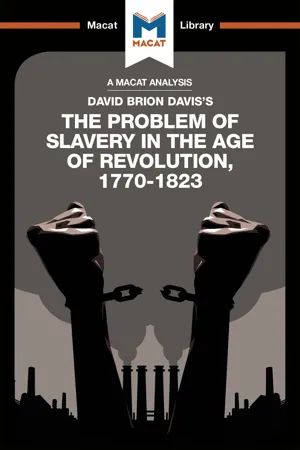
An Analysis of David Brion Davis's The Problem of Slavery in the Age of Revolution, 1770-1823
- 89 pages
- English
- ePUB (mobile friendly)
- Available on iOS & Android
An Analysis of David Brion Davis's The Problem of Slavery in the Age of Revolution, 1770-1823
About this book
How was it possible for opponents of slavery to be so vocal in opposing the practice, when they were so accepting of the economic exploitation of workers in western factories – many of which were owned by prominent abolitionists? David Brion Davis's The Problem of Slavery in the Age of Revolution, 1770-1823, uses the critical thinking skill of analysis to break down the various arguments that were used to condemn one set of controversial practices, and examine those that were used to defend another. His study allows us to see clear differences in reasoning and to test the assumptions made by each argument in turn. The result is an eye-opening explanation that makes it clear exactly how contemporaries resolved this apparent dichotomy – one that allows us to judge whether the opponents of slavery were clear-eyed idealists, or simply deployers of arguments that pandered to their own base economic interests.
Frequently asked questions
- Essential is ideal for learners and professionals who enjoy exploring a wide range of subjects. Access the Essential Library with 800,000+ trusted titles and best-sellers across business, personal growth, and the humanities. Includes unlimited reading time and Standard Read Aloud voice.
- Complete: Perfect for advanced learners and researchers needing full, unrestricted access. Unlock 1.4M+ books across hundreds of subjects, including academic and specialized titles. The Complete Plan also includes advanced features like Premium Read Aloud and Research Assistant.
Please note we cannot support devices running on iOS 13 and Android 7 or earlier. Learn more about using the app.
Information
Table of contents
- Cover Page
- Title Page
- Copyright
- Contents
- WAYS IN TO THE TEXT
- SECTION 1: INFLUENCES
- SECTION 2: IDEAS
- SECTION 3: IMPACT
- Glossary of Terms
- People Mentioned in the Text
- Works Cited